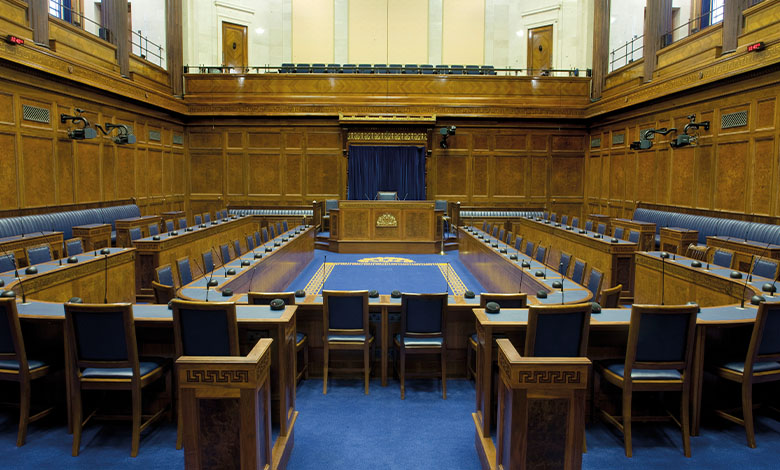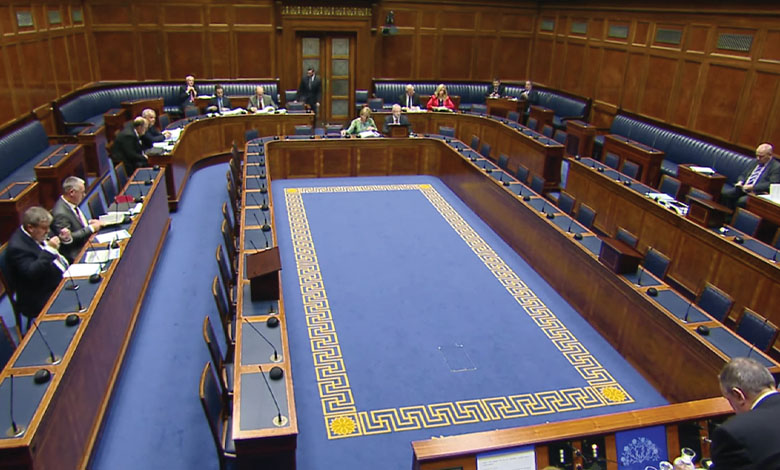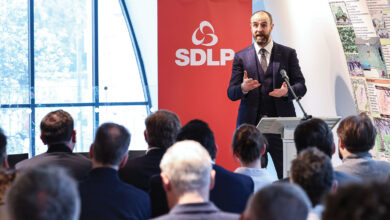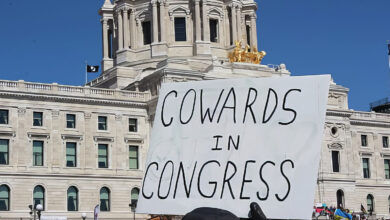Local parties back end to mandatory powersharing

The Alliance Party and the SDLP have endorsed a new report which has recommended a new process requiring a ‘supermajority’ rather than a cross-community vote for electing a Stormont speaker and rebranding the titles of First Minister and deputy First Minister, both of which would end the requirement for the DUP and Sinn Féin to formally work together.
The persistent collapse of the Assembly prompted a review into the process of establishing an Executive, with the two largest parties able to unilaterally either collapse or inhibit the formation of an Executive. As a result, the Assembly has spent around 11 of its almost 26 years inactive.
Chair of the Northern Ireland Affairs committee, Robert Buckland MP, has conceded that the proposed reforms by the committee are unlikely to come to fruition, as they are opposed by both Sinn Féin and the DUP.
Buckland became the new chair of the Northern Ireland Affairs Committee in December 2023 following Rishi Sunak’s autumn cabinet reshuffle which saw former chair Simon Hoare MP appointed as Parliamentary Under-Secretary of State for Local Government and Building Safety.
Buckland briefly served as the Secretary of State for Wales during Liz Truss’s ill-fated premiership, was Justice Secretary under Boris Johnson, and was Solicitor General for England and Wales under David Cameron and Theresa May.
Proposals
The report calls for the new nomination process for electing a speaker in the Assembly. Currently, either the DUP or Sinn Féin can effectively veto the nomination of a speaker even if a majority of the Assembly votes in favour of a candidate for speaker.
For instance, in January 2024, a majority of MLAs voted for SDLP MLA Patsy McGlone to be the new speaker, but since the DUP opposed his candidacy, it meant that McGlone was not appointed. Stormont can only be established if a speaker is elected. Due to procedural technicalities, Sinn Féin member Alex Maskey, who has not been an MLA since May 2022, formally remains the speaker of the Northern Ireland Assembly, representing the institution at events.
The report recommends that a two-thirds ‘supermajority’ be the threshold for the election of a speaker, a measure which would make it highly unlikely for a single party to be able to veto a candidacy for speakership.
Another headline-grabbing proposal is the changing of the names of the roles of First Minister and deputy First Minister to ‘Joint First Ministers’, which is already the de facto situation as the Executive Office is a joint political office. SDLP leader Colum Eastwood MP, in supporting the recommendations made by the committee, clarified that he believes that Michelle O’Neill MLA should be granted the title of First Minister for the duration of this term of the Assembly, and that the re-naming of the roles should take place in future terms.

Noteworthy is the fact that Sinn Féin, when O’Neill and her predecessor, the late Martin McGuinness, served as deputy First Minister, frequently referred to them as ‘joint first minister’, but this practice had no legal weight.
The report further recommends that the nominees for ‘Joint First Minister’ should, in an analogous manner to an election for speaker, be voted for through a ‘supermajority’, and that these people can be from any party, rather than the largest two as is currently the case. In practice, this would mean that the combined votes of the Alliance Party, Ulster Unionist Party, and the SDLP would be sufficient to keep either Sinn Féin or the DUP out of government.
Case for reform
Under the St Andrews Agreement, the First Minister and deputy First Minister must be nominees from the largest party within the largest bloc (unionist, nationalist, and others) within the Assembly, with the nominee for First Minister being from the largest party.
Under the current political makeup of the Assembly, this means that Sinn Féin is entitled to nominate a First Minister as it is the largest party, although it is not from the largest bloc, as there are 37 unionist MLAs (DUP, UUP, TUV and two independent unionists) and 35 nationalist MLAs (Sinn Féin and SDLP). The centrist Alliance Party (17 seats) and left-wing People Before Profit (one seat) designate as ‘other’ in the Assembly.
Under these rules, if the Alliance Party was to win more seats than the DUP but have less MLAs than combined unionist parties, it would not be entitled to hold the role of deputy First Minister, with that entitlement falling to the largest unionist party in the Assembly in that scenario.
A further point of contention for proponents of reform is the fact that the Executive can be collapsed if either the First Minister or deputy First Minister wishes to, regardless of the views of other parties in Stormont or even in the Executive.
The DUP has historically criticised this mechanism following Martin McGuinness’s resignation as deputy First Minister in 2017, which led to the collapse of the Executive for three years. However, as the DUP is currently boycotting Stormont, its position on this requirement has seemingly receded as this now aligns with the party’s interest.
Political fallout
Sinn Féin and the DUP have not commented on the findings of the committee. However, previous statements have shown that Sinn Féin does not support a change to the rules of the Assembly while Northern Ireland remains part of the UK.
The DUP, on the other hand, has traditionally supported measures akin to those suggested into the report, including the end of ‘mandatory coalition’. The DUP will not be in any rush to endorse the report as it has a strategic advantage which it can utilise under the current rules to keep the Assembly inactive.
The report has been endorsed by the Alliance Party (which published a policy document in 2023 calling for Stormont reform), the SDLP, the UUP, and the UK Government. The Irish Government has not endorsed the report, with Taoiseach Leo Varadkar saying that there is a need to be “careful” about reforming the Good Friday Agreement.
The report states that implementation of these recommended changes would require consultation with the Irish Government as co-guarantors to the Belfast/Good Friday Agreement as well as the parties of Northern Ireland and would require tweaking the 1998 Northern Ireland Act that came from the Agreement.
As the Irish Government, Sinn Féin, and the DUP all oppose changing the rules in the immediate term, it is highly unlikely that these recommendations will be implemented in the foreseeable future.





